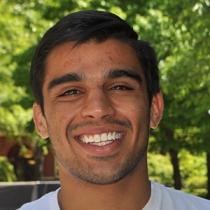
Camilo A Duarte
After you graduate, what is your next adventure?
I will be doing an internship at Lockheed Martin's Advanced Technical Center in Palo Alto, mostly focusing on space telescopes. Then I'll be returning to Tech to join Professor Theodorou's lab.
What about your next adventure are you most looking forward to?
I'm definitely excited about grad school. It's a chance to really dig into subjects that are interesting to me. At the end of your undergraduate program, you already knew what you are most interested in, but you are responsible for doing other things that you don't necessarily like when the only thing you want to do is go to the lab. Everyone in the lab I am joining - Autonomous Control and Decision Systems Lab - they enjoy what they are doing and I already feel comfortable working with them.
Did you have any previous co-op, internship, or research experience in this area?
I came to Georgia Tech as a transfer student from Montgomery College in Maryland, so I took a little longer to finish because I came in as a junior, but I also did several internships - three with NASA and two with Lockheed Martin. I did the internships because I was really interested in what each one had to teach me, but it also helped that they paid me.
My first research project - working with [research engineer] Russell Peak - focused on systems engineering for the Europa Clipper. This was a turning point for me because it got me my first job at NASA Huntsville in the fall of 2016. At Huntsville, I worked on a smallsat - the Near Earth Astroid Scout. This is where I realized I really liked controls. It's both mathematical and practical, the perfect middle ground between working on software and hardware.
In the spring of 2017, I did research with Dr. Walker, where we worked on Lockheed Martin's arc-jet, a very small electric propulsion jet engine. I had contacted Dr. Walker about doing research before, but I didn't get the position. I decided to go back, and, this time, having worked at NASA Marshall, I think he saw something different. The thing about getting a position in Dr. Walker's lab is: you have to show that you are very motivated and interested in the topic. Once he sees that, he's all in.
That semester, I had to learn about engines, about testing procedures, so I met with the Lockheed Martin folks. There were a lot of long shifts and sleepless nights, that semester, but I learned a lot.
I was surprised that summer when Lockheed Martin called me to do an internship in controls in Palo Alto. I didn't have a lot of experience in controls, but I just clicked with my boss. The interview that was supposed to be an hour, but we talked for much longer. In interviews, you must show that, while you might not have all the skills, you have the motivation and the ability to communicate.
Throughout my time at Tech, I always threw my resume in for jobs that might become available at NASA. In the fall of 2017, NASA Langley called. They were offering a job working on a robotic manipulator for an in-space assembly. It's funny because when they called I had to tell them that I needed to focus on my [formal] education. I mean, I had graduated from high school [in Colombia] in 2011, had to learn English for two years before even starting college...and I still had so much more to do. I felt a little pressured. But I recommended another guy -- I'd worked with him at NASA Marshall -- and he got the job.
That fall, I worked with Prof. Glenn Lightsey on the Micro Nimbus project, mostly working on software. In the spring of 2018, I needed a little money and I needed more experience in autonomous systems, so I went to NASA Langley. I saw it as a good opportunity to build the appropriate skillset in a more challenging area of aerospace engineering. I worked on replicating the dynamic behavior of a rocket during launch. That summer I realized I needed to learn more about machine learning, so, when I came back, I contacted Dr. Theodorou, to see if I could work with him.
It was a great choice. He's the kind of professor who really cares about everyone learning all of the concepts. At his lab meetings, we'd go over technical papers on machine learning and discuss them for three-and-a-half hours. This past semester, I've been working with him on finding an algorithm that will allow us to determine mathematical models for dynamical systems.
How did your educational experience at Georgia Tech help you to achieve your goals?
At Georgia Tech, you have so many research projects going on. And the professors are passionate. The fact that I was able to jump between different research projects to decide what was right for me, this was powerful. The hardest part was that I could only do one project per semester. But even that forced me to think more critically.
What advice would you give to an underclassman who would like to follow the same path?
Take the time to figure out what you like because, sure, you can just come to school and do the traditional four years and get a job, but there is so much more possible. I have a full-time job offer in the field, which is great to know, but I know there is much more for me to learn. That kind of pushed me to go to grad school. I want to know more.